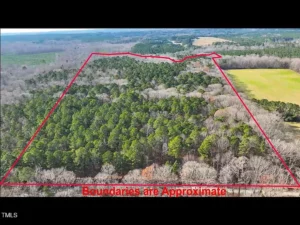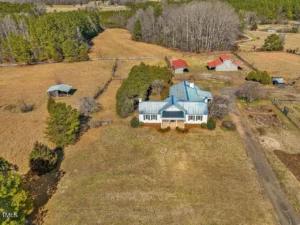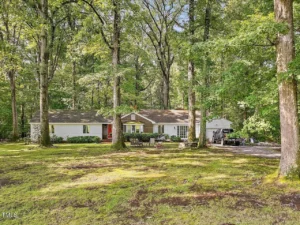Accredited Land Consultant Eric Andrews discusses being buried on your land in Chatham County and in North Carolina. Yes, you can usually be buried on your land in the State of North Carolina. But, should you? Graves require an easement which is an encumbrance on the property.
Speaker 1: Can you be buried on your land in North Carolina?
Speaker 2: Yes. Maybe, probably. So there’s no North Carolina law as far as can you be buried on your own property? That is actually a local ordinance and most places you can be, but should you?
Speaker 1: Can you be buried in Chatham County?
Speaker 2: Yes. But should you? So yeah, you can either coordinate with your funeral director or with your state, or you can do it yourself and work it out with the county. So you go to the county clerk and you get an application for that. You do have to have, if you’re going to have a body buried in a coffin or a pine box, you do have to have that surveyed and you do have to have an easement for visitation. So that’s a little bit complicated and people always say, “Well, what difference does it make? I don’t care if anybody visits me, I just want to be buried on my property.”
The county doesn’t like that because there might be a long lost nephew that wants to visit uncle Bob that’s buried on Dewitt Smith Road and you have to grant them access. So they’re going to require you to have an easement.
Speaker 1: I was going to say, what are they going to do to you if you get buried there anyways?
Speaker 2: Yeah. So I mean, well there are laws and rules and everything. So it’s still happening today. I mean, I’ve had friends that have done it and I just walked a piece of property yesterday that had a buried urn. Now it was a pine box urn. That person was buried 10 years ago. They just wanted to be buried on the land and they didn’t have any family that’s visiting him, but it’s still a required easement. That’s an encumbrance on the property that not everybody is going to like the fact that they’re buying a piece of property and it has a marked grave.
Speaker 1: That’s there forever.
Speaker 2: It’s there forever. It’s there forever and…
Speaker 1: 10,000 years from now.
Speaker 2: Well, I don’t know if there’s going to be a United States 10,000 years from now. Well, hopefully, but it’s amazing longevity. I can tell you that I’ve had issues with cemeteries in Chatham County from the 1800s. So that’s pretty close to forever.
One of the sad things that I see when I walk pieces of land and it’ll be a family cemetery, they’ll have the headstone from 1872, they’ll have the headstone from 1894 and they’ll have some from 1932 and 1941. But then they’ll have just a bunch of small stones and that’s from the flu epidemic of 1914 to 1917. Lots of old people died and lots of children died and so you can see the small dents in the ground. So you know it was so many burials that they didn’t always have time to do a proper tombstone. There was usually a headstone of something.
I’ve seen just stones and indentations in the ground. A lot of them are marked by GIS in the county. They’re supposed to be on a survey as well. There are actually grave locators. So we did a shopping center here in Chatham County and when they were looking at the dirt to see whether or not they could put the shopping center there, a guy goes around with rebar hitting the ground. He saw indentations that might have been graves and sure enough, there were some unmarked graves or whatever. So that shopping center, and we won’t talk about which shopping center it is, but it had to be built around those graves.
They can be moved, but that’s a really, really difficult process. So if there are living heirs and living family members, they have rights to visit their ancestors. You’re right, that’s forever and ever. It goes with the land. So I had a 17 acre tract of land for sale in Silk Hope and this was probably a time when the land was worth around $120,000. I had this land for $75,000 because sure enough, there was… This was a big one. This was 75 feet by 75 feet, black iron fence. It had a couple five and six foot headstones. I mean, real monuments and it had the family name and there was probably 30, 40 people buried in this…
Speaker 1: How big a property was that?
Speaker 2: It was 17 acres. So it used to be a much, much bigger farm, but this was the 17 acres that were remaining. Sure enough, that cemetery was smack dab in the middle of the property and of course it had an easement. Even though nobody had been buried in that family cemetery for 50 years, it was still maintained by the family. They still weed eated it and kept it clean and everything. So they had forever rights.
Well, this was in Silk Hope and the soils weren’t all that great and the area that perked was fairly close to the grave site. Sure enough, I had a Yankee come down from the Northeast and he is like, “Why is this land so cheap?” I was like, “Well, we have this cemetery right in the middle.” He’s like, “It doesn’t bother me.” So he bought that. He was thrilled that he could buy 17 acres for 75,000 and he came back and visited us several months later after he had built a house. I asked him how it was out there and how was the cemetery? He said it was quietest neighbors he ever had.
But one of the things that you need to consider, so you have this wish to be a part of your land. You want to be buried on your land and everything. You do have to consider the permanence of that. It is not everybody wants to buy land that has a cemetery on it, or even one person buried on it. The other interesting thing is that North Carolina is liberal with cremation remains and ash disposal. So if you want to be part of the land, it’s much better to just spread the ashes around on the property. You are part of the land. There’s no easement necessary. There’s no disclosure necessary. There’s no encumbrance. There’s not an actual urn or anything that’s buried on the property. The person can become one with the property and it’s not an encumbrance on the property forever and ever.
Speaker 1: The whole time you’re talking I’m kind of wondering how much longer can we go on just-
Speaker 2: Doing this.
Speaker 1: Sticking people in the ground. Yeah.
Speaker 2: Yeah. Well, you look at some urban areas and it’s pretty… I mean, that’s some valuable real estate in Chatham County. I mean, we have plenty of land for cemeteries, wherever. I had a church situation where this is quite the situation. A gentleman had 20 acres. He donated five acres to the church for a church and a cemetery. The church maxed out their land and started burying people on the 15 acres and so that’s quite the situation where you have a cemetery encroachment. That was my first cemetery encroachment, but it’s not very common. If somebody asks me about it, I don’t recommend it just because the property is somewhat stigmatized and there is a devaluation. I don’t know what it is. Not everybody has a problem with it. I will say the one that I showed yesterday that was an urn and a pine box that was 10, 15 years ago, I doubt the box is even in the ground anymore. That’s probably been eaten up and long gone or whatever, but that easement’s still there.




